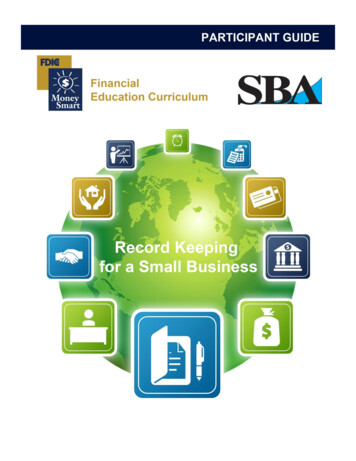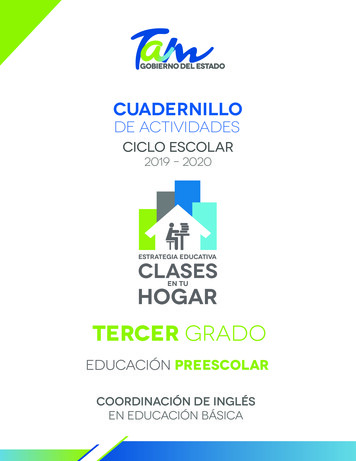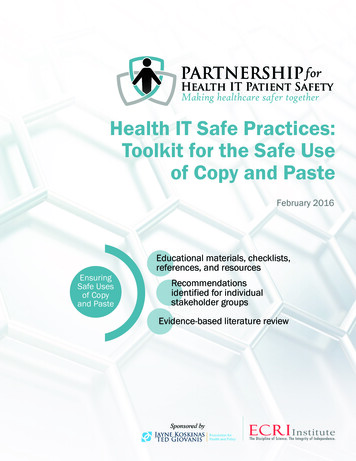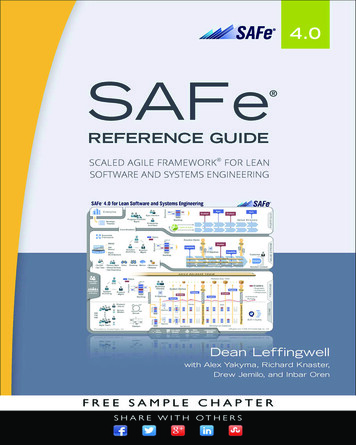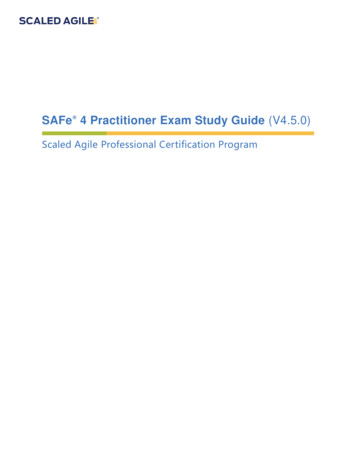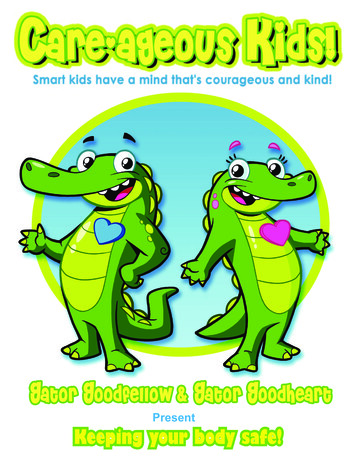
Transcription
PresentKeeping your body safe!
Hi! We are Gator Goodheartand Gator Goodfellow.We are here to talk to you aboutkeeping your body safe!
Our bodies are special and wonderful.Our bodies belong to us and we have to takecare of them. We care for our bodies by:
Draw a picture of a way to keepyour body safe and healthy.
Your body belongs to you and you have thepower to do amazing and fun things with it.Some things we do are:Draw a picture of a Good Touch!These are called Good Touches.Good Touches make us feel safe and happy.
Some touches don’t feel good. Like when:Draw a picture of a Bad Touch.These are called Bad Touches.Bad Touches make us feel hurt or scared.
We have the power to decide how we will betouched. You get to decide what is a GoodTouch for you!“I like to betickledsometimes!”“I don’t like to betickled at all!”Even grown-ups are supposed to listen whenyou tell them you don’t want to be touched.
Circle the pictures that show a Good Touchand put an X over the pictures that showa Bad Touch.
Some parts of the body are private. These arethe parts that we cover with clothes even whenwe go swimming. You do too!
When we were little,our parents touchedour private body partswhen we got a bath orhad a diaper change.Sometimes, yourparents might putmedicine on yourprivate body parts ifyou are hurt or sick.Sometimes duringa checkup, a doctormay touch yourprivate body parts.But your mom or dadwill be in the roomwhen thishappens.No one should touch your private body parts forany other reasons! Not even someone you knowand love.
If someone tries to touch your private bodyparts in a way that makes you feel scared orupset, you have the power to sayTell a grown-up you can trust!
If someone asks you to look at or touch theirprivate body parts, say, “No! I don’t want to!”Tell a grown-up you can trust!
If someone touches you and tells you not to tellanyone, say “No! I don’t keep secrets like that!”SHHHH!Even if it’s scary,Tell a grown-up you can trust!
If anyone makes you feel strange oruncomfortable, run away as soon as you can.Tell a grown-up you can trust!
Remember.It’sTON!tluaFrYouIf you were touched, the person who touchedyou is the only one to blame.
Don’t be afraid to tell a grown-up you can trust!Keep telling until someone believes and helpsyou. Who can you tell?DDMama, Dad orother relativeA friend’s parentYour teacherThe DoctorA police officer
Remember.You are a SuperGator! Your bodybelongs to you and you have the power to helptake care of it.DCTalk to grown-ups you trust about more waysyou can work together to keep you safe andhealthy!
To the parents:As a parent, it can often be scary to address the topic of sexual abuse with your child. However, childrenneed to be taught about personal (sexual) safety as openly as they are taught about road safety and watersafety. While this book is a wonderful starting point, it is important to remember that all blame for sexualviolence lies with the perpetrator. Children can do only so much to reduce their risk of sexual violence,and therefore need their parents to actively participate in protecting them.Some easy and effective steps that can be taken to protect all the children in your life are: Understand that childhood sexual assault does happen with alarming frequency. One in four girlsand one in six boys will experience sexual violence before the age of 18. Educate yourself about risk factors for sexual violence. Use that information to help make decisionsregarding your children’s safety. Know that the vast majority of child sexual abuse occurs when there is a one-child/one-adultsituation. If such situations can be reduced, so can the risk of abuse. Encourage your child to talk with you about anything that happens that makes them scared orworried. Tell your child to never keep a secret that makes them feel this way, even if anotheradult tells them to. Teach your child that their body can warn them when a situation is wrong or dangerous. They mightget a tight feeling in their tummy or feel scared. Talking about what these feelings mean helpschildren to recognize and trust their own feelings. Remember, most of the time, physical symptoms of abuse are not present. You are more likely to seeemotional and behavioral symptoms. However, some children show no signs at all. Know what to do if you receive a disclosure of abuse from a child. Tell the child you believe them. Tryto stay as calm as possible. Know where to get help in your community. A supportive reaction to adisclosure will help a child in her or his healing process. Tell others what you know. Encouraging conversations about risk reduction with your family andfriends can help protect children in your community. Consider volunteering for an organization thatfights against child sexual abuse.Feel free to call your local rape crisis center to discuss prevention of child sexual abuse and other forms ofsexual abuse if you have questions or need more information.
LOUISIANAFOUNDATIONAGAINST SEXUALASSAULT1250 S.W. Railroad Ave, Suite 170Hammond, La 70403Phone (985) 345-5995Fax (985)345-5592Toll Free Information Line:(888) 995-7273www.lafasa.orgThis document was produced using Crime Victim Assistance Program funds under subgrant # C06-8-025 from theLouisiana Commission on Law Enforcement and the Administration of Criminal Justice.
Know that the vast majority of child sexual abuse occurs when there is a one-child/one-adult situation. If such situations can be reduced, so can the risk of abuse. Encourage your child to talk with you about
